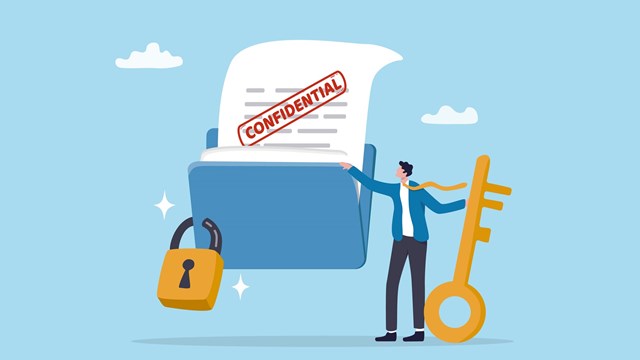
Living in a community association can sometimes be – or at least feel – complicated. For most people, their home is their biggest single investment, and the value of that individual investment depends a lot on the cooperation of neighbors, management, and board to make competent, informed decisions that maintain or increase the value of the larger property. Given the stakes, more active, involved residents may want not only to attend open meetings, but to occasionally review association documents – both to stay informed and to make sure everything is on the up-and-up. If you happen to be one of those engaged unit owners – or are a trustee yourself – it pays to know what information non-board residents are entitled to access, and what’s for board members’ eyes only.
New England Condominium spoke with several legal and management professionals throughout the region about what documents and information residents can request to review in different types of multifamily communities, as well as what boards and managers must keep confidential.
Scott J. Sandler, Managing Partner at law firm Sandler, Hansen & Alexander, LLC, in Middletown, Connecticut
“Connecticut’s version of the Common Interest Ownership Act (CIOA) contains an extensive provision that addresses the ability of owners to inspect and copy association records,” says Sandler. “Most association records must be open to the owners for inspection. The association is not required to synthesize or compile any information just because an owner wishes to see it, but to the extent a record exists, it would generally be available for the owners to inspect.
“The association may not permit owners to inspect personnel, salary, and medical records relating to specific individuals, unless waived by the persons to whom such records relate; or information the disclosure of which would violate any law.
“Additionally,” says Sandler, “the association may choose to withhold the following records:
a. Contracts, leases, and other commercial transactions to purchase or provide goods or services currently being negotiated;
b. Existing or potential litigation or mediation, arbitration or administrative proceedings;
c. Existing or potential matters involving federal, state or local administrative or other formal proceedings before a governmental tribunal for enforcement of the declaration, bylaws or rules;
d. Communications with the association’s attorney which are otherwise protected by the attorney-client privilege or the attorney work-product doctrine;
e. Records of an executive session of the executive board; or
f. Individual unit files other than those of the requesting owner.
“The association may charge a reasonable fee for supervising an owner’s inspection of its records and for supplying copies to the owner,” adds Sandler.
Matthew W. Gaines, a partner at the Condominium Practice Group and Real Estate Department of law firm Marcus, Emmer, Errico & Brooks, which has offices in Massachusetts and New Hampshire
According to Gaines: “Pursuant to Massachusetts General Law c. 183A, Section 10(c), an association is required to keep a complete copy of the following items:
a. The master deed and any amendments;
b. The bylaws and any amendments;
c. The minute book, to the extent such minutes are kept
d. Financial records, including the following:
Records of all receipts and expenditures, invoices and vouchers authorizing payments, receivable and bank statements relating thereto;
Records regarding the replacement reserve fund or any other funds of the association and bank statements;
Audits, reviews, accounting statements, and financial reports relating to the finances of the association; contracts for work to be performed for or services to be provided to the condominium; and
All current insurance policies of the association
“As for documents that owners are prohibited from seeing,” Gaines continues, “that would include matters regarding personnel (i.e. employees of the condominium), personal information (such as which accounts are delinquent in paying), and matters involving attorney/client privilege.
“The records listed above must be available for the reasonable inspection by a unit-owner during regular business hours, and at such other times as may be provided by the property manager. Access to said records includes the right to photocopy the records at the unit owner’s expense. The records should be retained for a period of at least seven years.”
Finally, says Gaines, “the Massachusetts Condominium Act is silent as to consequences if a board fails to provide access to these records. While legislation has been filed in the past to add some teeth to the statute in the event a board refuses to provide access, that legislation did not pass.”
Joseph G. Carleton, Jr., Of Counsel with Jensen Baird Gardner & Henry in Portland, Maine
“Maine has extensive disclosure requirements benefiting unit owners, taken from the Uniform Common Interest Ownership Act and incorporated into Maine law,” says Carleton. “I think it’s fair to say that the broad reach of this law has made boards and managers uncomfortable at times. I think that simply quoting the statute will answer most people’s questions.
“According to §1603-118 of the Maine Condominium Act on Association Records, an association must retain the following:
Records of receipts and expenditures affecting the operation and administration of the association and other appropriate accounting records for the past 6 years;
Minutes of all meetings of its unit owners and executive board other than executive sessions, a record of all actions taken by the unit owners or executive board without a meeting and a record of all actions taken by a committee in place of the executive board on behalf of the association;
The names of current unit owners in a form that permits preparation of a list of the names of all unit owners and the addresses at which the association communicates with them, in alphabetical order and showing the number of votes each unit owner is entitled to cast;
Copies of its original or restated organizational documents and bylaws and all amendments to them and all rules currently in effect;
All financial statements and tax returns of the association for the past 3 years;
A list of the names and addresses of its current executive board members and officers; [2011, c. 368, §8 (NEW).]
Its most recent annual report delivered to the Secretary of State;
Financial and other records sufficiently detailed to enable the association to comply with section 1604-108;
Copies of current contracts to which it is a party;
Records of executive board or committee actions to approve or deny any requests for design or architectural approval from unit owners; and
Ballots, proxies and other records related to voting by unit owners for one year after the election, action or vote to which they relate.
Carleton goes on to say that “(b) Subject to subsections (c) and (d), all records retained by an association must be available for examination and copying by a unit owner or the unit owner’s authorized agent during reasonable business hours or at a mutually convenient time and location; and upon 10 days’ notice in writing reasonably identifying the specific records of the association requested. Records retained by an association may be withheld from inspection and copying to the extent that they concern:
Personnel, salary and medical records relating to specific individuals;
Contracts, leases and other commercial transactions to purchase or provide goods or services currently being negotiated;
Existing or potential litigation or mediation, arbitration or administrative proceedings;
Existing or potential matters involving federal, state or local administrative or other formal proceedings before a governmental tribunal for enforcement of the declaration, bylaws or rules;
Communications with the association’s attorney that are otherwise protected by the attorney-client privilege or the attorney work-product doctrine;
Information the disclosure of which would violate law other than this Act;
Records of an executive session of the executive board; or
Individual unit files other than those of the requesting unit owner.
“An association may charge a reasonable fee for providing copies of any records under this section and for supervising the unit owner’s inspection,” Carleton continues. “A ‘right to copy records’ under this section includes the right to receive copies by photocopying or other means, including copies through an electronic transmission if available upon request by the unit owner.
“An association is not obligated to compile or synthesize information, and information provided pursuant to this section may not be used for commercial purposes or any other purpose not reasonably related to the management of the association or the duties, rights or responsibilities of unit owners, officers or executive board members under this Act or the association’s governing documents.
“The Maine Nonprofit Corporation Act, Title 13-B,” Carleton adds, “also provides for penalties in case of failure to provide records, but the application of this requirement to the above requirements of the Maine Condominium Act is uncertain.”
The takeaway from these various experts is – whether you live in a co-op, condo, or HOA – know your own rights, as well as the rights of the residents you govern when it comes to accessing documents and information about your community. Keeping things transparent not only keeps you on the right side of the law, but also fosters faith in and respect for all the work the board does to keep the building or association running smoothly.
Mike Odenthal is a staff writer/reporter for New England Condominium.









Leave a Comment